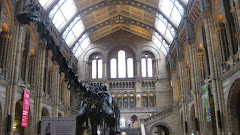The impact of the railway, as discussed in class, cannot be overestimated, whether in terms of Victorian or human history. After all, we had for millennia travelled on land only by foot or horse before, so this first mechanized transport had an effect that no other advance can claim. Railways literally mobilized countries from being agricultural to industrial societies. Such a radical societal transformation had a corresponding effect on Victorians’ world-views, as explored in great detail by Michael Freeman in
Railways and the Victorian Imagination. The Victorians’ environment was now something that could be conquered, bridged over or tunneled through. Their cities were now closely connected, while the countryside was for the first time seen in all its variety, though inevitably with a sense of the unimportance of a “ride-over zone” compared to urban centers of industry. People themselves became less rooted and more anonymous, creating the polite reserve of stranger-commuters stuck together in a railway car. Finally, the machines themselves inspired a huge diversity of reactions. The railway's very novelty, I suppose, encouraged a variety of responses to it, but were there other grounds for people's reactions to the railway? Why did some people see a train as a great hulking demonic beast, while others associate it with exhilarating flight? Does this variety correspond to class, education, gender and the like? Or perhaps chronology, as people became used to trains and lost some of their nervousness about them? Or did the same people think of trains with both fear and a sense of exhilarating freedom? Why did none of the reticence about trains, about their smoky, devilish general character or their possible ill effects on human health, transfer to investors, who funded enormously rapid growth of railways across Britain? Two paintings, W.P. Frith's
The Railway Station and J.M.W. Turner's
Rain, Steam, and Speed, show especially well the enormous variety of people who used and were influenced by the railway and the emotional impact of seeing a train's massive black form hurdle unthinkingly through space.







No comments:
Post a Comment